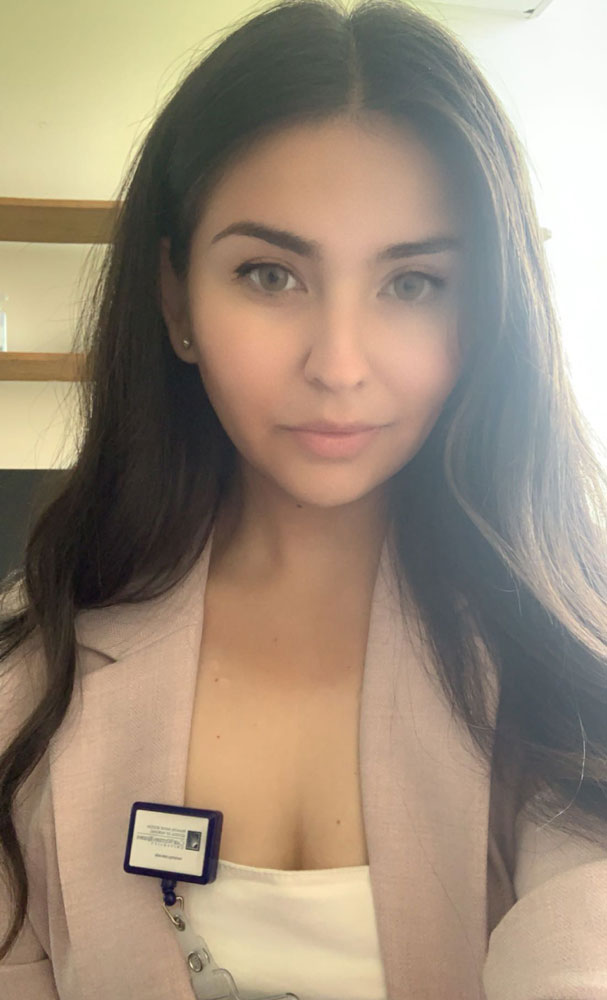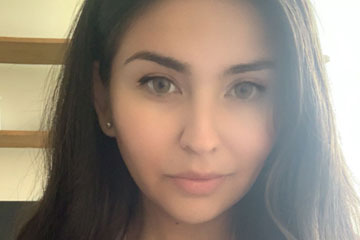Hispanic Heritage Month takes place each year from Sept. 15 through Oct. 15. Throughout the month, The Daily will highlight members of the university community who are of Hispanic heritage to celebrate their accomplishments and shed light on their experiences at CWRU.

Estefania Hernandez hasn’t had a chance to visit her hometown of El Paso, Texas, for a little more than two years. When visits aren’t feasible, she said it can be easy to fall out of touch with her cultural roots.
Hispanic Heritage Month reminds her to stay proud of those roots—and to reflect on the people who helped her get to where she is now: a PhD student in medical anthropology and Master of Public Health student at Case Western Reserve University.
While Hernandez was born and raised in El Paso, her father, Rodolfo, was born in Chihuahua, Mexico, and her mother, Elsa, was born in Cuídad Juárez in Mexico. Now, both sides of her family are spread across several different cities in Mexico and Texas.
“We commuted to Juárez frequently [during my childhood], so I would like to think I grew up across the border, too,” Hernandez said.
They may be hundreds of miles apart, but there’s an easy way to get her family together, she mused—just tell them there’s an event at the ranch owned by her grandparents, Mamá Carmelita and Papa Benjamín. Their ranch has been in the family since before Hernandez was born—and its walls have bore witness to dozens of birthday parties, engagement celebrations and more.
“That ranch can get pretty fun,” Hernandez said. “Let me tell you, a Mexican-style potluck is a place you want to be—enchiladas, tacos, shrimp ceviche and flautas. Also, my mother will always be the first one to start dancing and she will reel you in to do some cumbias with her.”
Calling Cleveland home
After receiving her bachelor’s in anthropology from The University of Texas at El Paso in 2018, Hernandez knew she wanted to further her studies in the subject. According to her, anthropology humanizes people—and it allows her to think differently, proactively, and compassionately toward others, despite their histories, failures or successes—while contributing to science.
All she needed to do was find the perfect program. During her graduate school search, Hernandez was looking for top dual-degree master’s programs in medical anthropology and public health. She found what she was searching for at Case Western Reserve.
“In fact, I had several ‘it’s too good to be true’ moments when I realized I could apply and potentially get accepted,” she explained. “I am attracted to the topics current anthropology department professors are working on and the courses being taught. Moreover, being so close to University Hospitals and Cleveland Clinic provides academic and professional engagement in ways I never knew I would be able to be a part of.”
Since arriving, Hernandez learned she didn’t even have to venture outside of CWRU for hands-on academic opportunities. Hernandez and Stephanie Griggs, assistant professor at the Frances Payne Bolton School of Nursing, where Hernandez is a graduate research assistant, recently received the American Academy of Sleep Medicine Foundation 2021 Diversity Supplement Grant, which will be used to support Hernandez’s training in sleep and circadian research. Together, Griggs and Hernandez will work to understand and improve self-management among young adults with Type 1 Diabetes.
Upon graduation, Hernandez plans to continue her work in medication-assisted treatment and sleep medicine, either in academia or in the field. She’s also interested in research surrounding health care utilization and physician-patient interactions. Learn more about Hernandez.

